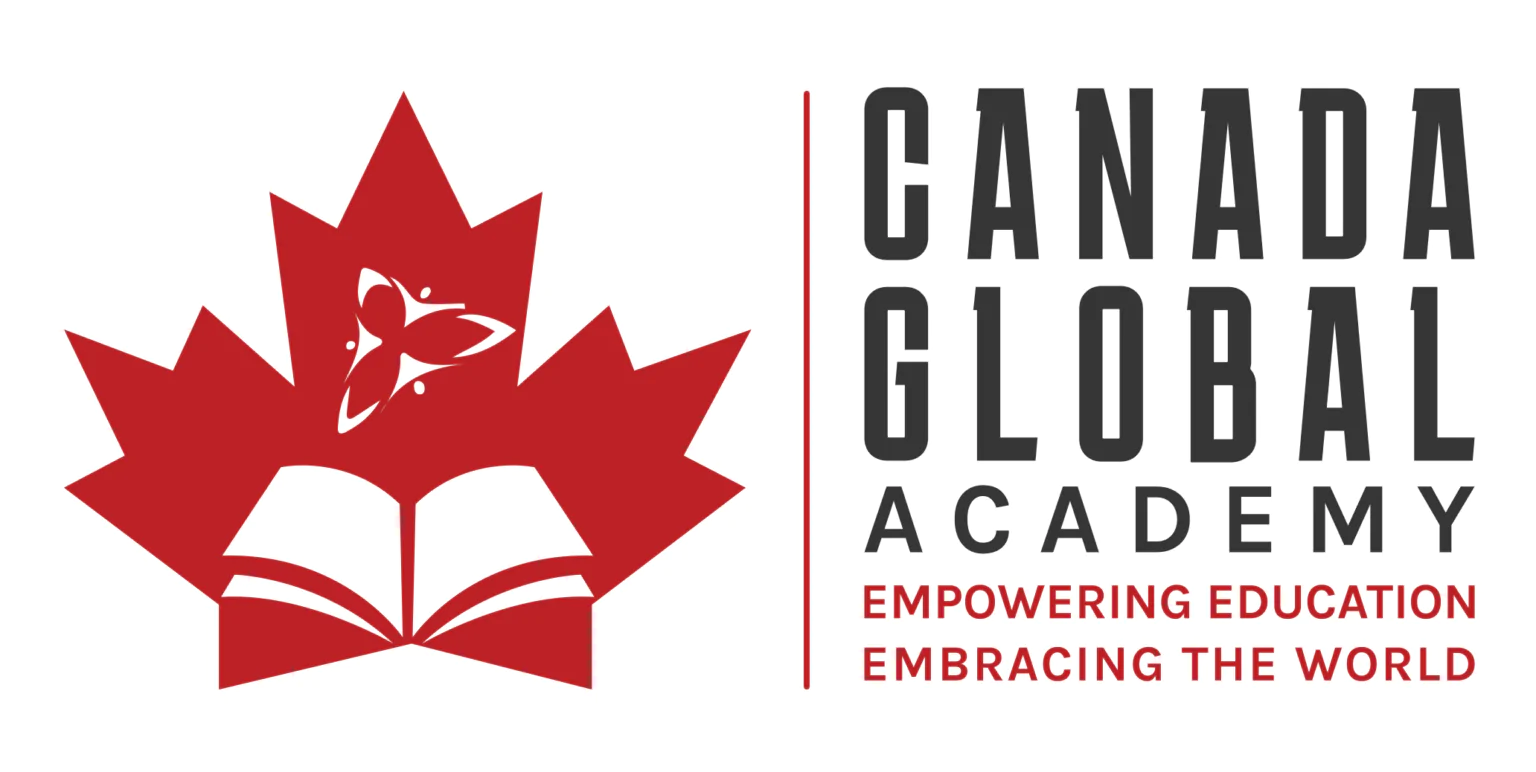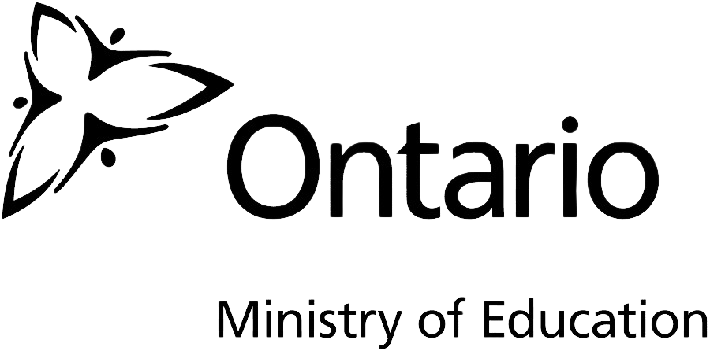The Ontario Ministry of Education is at the forefront of innovative education, striving to provide student-centered learning experiences that empower every learner to reach their full potential. Through their progressive education vision, the ministry aims to create an inclusive and equitable education system that prioritizes the needs and aspirations of students.
In line with the Ontario Ministry of Education’s vision for student-centered learning, the education system focuses on fostering a student-focused learning environment that cultivates critical thinking, creativity, collaboration, and communication skills. By placing students at the center of their education journey, Ontario aims to inspire a love for learning and equip students with the knowledge and skills necessary for success in the 21st century.
The innovative education vision of the ministry encompasses a wide range of initiatives and strategies that promote personalized learning, differentiated instruction, and the integration of technology in classrooms. This forward-thinking approach aims to cater to the diverse learning styles and individual needs of students, ensuring that each learner receives a tailored education experience.
By embracing student-centered education, the Ontario Ministry of Education believes in the power of high expectations, inclusivity, and continuous improvement to transform the educational landscape. Whether it’s providing resources for students with diverse abilities, fostering cultural understanding, or offering meaningful choices in assessment, Ontario is committed to creating an education system that prepares students for success in an ever-changing world.
Join us in embracing the Ontario Ministry of Education’s vision for student-centered learning and discover how your child can thrive in a supportive and enriching education environment.
Learn more about our student-centered learning approach at Canada Global Academy.
Recognizing Students’ Diverse Abilities and Needs
Ontario understands that students have diverse abilities and needs, and it is committed to creating an inclusive education system. The province recognizes that every student deserves equal access to quality education and opportunities for success, regardless of their abilities. Ontario ensures that appropriate support and accommodations are provided to students with disabilities and special educational needs. By recognizing and addressing the unique needs of each student, Ontario aims to create an inclusive learning environment that promotes diversity and equity.
At the heart of inclusive education is the belief that every student brings valuable contributions to the classroom. Ontario values student diversity and strives to create learning environments where all students feel valued, included, and supported. Inclusive education goes beyond physical access; it encompasses creating welcoming and accepting spaces where students can develop their full potential.
Inclusive education practices involve adapting teaching strategies, materials, and assessments to meet the diverse needs of students. Ontario encourages educators to employ a wide range of instructional approaches to accommodate different learning styles and abilities. By adopting an inclusive approach, educators can create a classroom culture that celebrates diversity and fosters an understanding of individual strengths and challenges.
Through inclusive education, Ontario aims to empower all students to reach their full potential and become active and engaged citizens. It recognizes that diverse abilities and needs should not be a barrier to academic success or personal growth. By embracing student diversity, Ontario promotes a society that values inclusivity and celebrates the unique contributions of each individual.
| Benefits of Inclusive Education | Examples of Inclusive Education Practices |
|---|---|
|
|
By implementing inclusive education practices, Ontario aims to create an educational experience that meets the diverse abilities and needs of students. These practices not only benefit students with disabilities or special educational needs but also contribute to the overall growth and success of all learners.
Ontario’s commitment to recognizing students’ diverse abilities and needs is a testament to its dedication to providing an equitable and inclusive educational experience. Through inclusive education, Ontario strives to build a society that values diversity, fosters empathy and understanding, and prepares students to thrive in an increasingly diverse world.
Readiness to Learn as a Foundation

The Ontario Ministry of Education believes that readiness to learn is the foundation for a successful education. Readiness to learn encompasses a range of factors, including physical, social, emotional, and cognitive readiness. Ontario focuses on fostering a positive and supportive learning environment that promotes each student’s readiness to learn. By providing resources and strategies to enhance student readiness, Ontario aims to create a strong foundation for lifelong learning and academic success.
To ensure that students are prepared to learn effectively, Ontario recognizes the importance of addressing their holistic needs. Physical readiness involves promoting healthy lifestyles and providing access to resources that support students’ physical well-being. Social readiness is fostered through the development of strong relationships, collaboration, and teamwork. Emotional readiness involves promoting self-awareness, self-regulation, and supporting students’ mental health and well-being. Cognitive readiness focuses on developing critical thinking skills, problem-solving abilities, and knowledge acquisition.
Creating a positive and supportive learning environment is essential in nurturing student readiness. Ontario emphasizes the importance of inclusive and student-centered practices that promote engagement, motivation, and a sense of belonging. By addressing individual learning needs and providing a variety of learning opportunities, Ontario aims to cater to diverse student readiness levels and learning styles.
Efforts are made to provide students with the necessary resources and strategies to enhance their readiness to learn. This includes professional development opportunities for educators to stay up-to-date with research-backed practices that support student readiness. Additionally, Ontario encourages collaboration between educators, parents, and community partners to ensure a comprehensive approach to supporting student readiness in and out of the classroom.
The Ontario Ministry of Education’s commitment to student readiness lays the foundations for a successful and fulfilling education. By prioritizing and investing in student readiness, Ontario prepares students for lifelong learning, personal growth, and future success.
To learn more about how Ontario’s education system promotes student readiness and provides quality learning opportunities, visit Canada Global Academy today.
Language Barriers and Cultural Understanding
Ontario recognizes the impact of language barriers and the significance of cultural understanding in education. With its diverse student population, Ontario values inclusivity and multiculturalism as essential pillars of the education system. Efforts are made to address the language needs of students who are English language learners, ensuring they have access to appropriate language support programs.
In addition to tackling language barriers, Ontario also prioritizes cultural understanding by providing resources and opportunities for students to learn about different cultures. By fostering an inclusive and respectful learning environment, Ontario aims to create a space where students can embrace diversity and develop a global mindset.
The promotion of cultural understanding not only enhances students’ educational experience but also prepares them to thrive in a multicultural society. By celebrating diversity and encouraging intercultural dialogue, Ontario cultivates mutual respect, empathy, and collaboration among students, laying a strong foundation for a harmonious and inclusive society.
“Education is the passport to the future, for tomorrow belongs to those who prepare for it today.” – Malcolm X
At Canada Global Academy, we recognize the vital role of language barriers and cultural understanding in education. Our holistic approach to learning embraces student diversity and promotes multiculturalism. We offer a wide range of language support programs tailored to meet the specific needs of English language learners, ensuring that every student has the support they need to succeed.
Through our culturally diverse and inclusive learning environment, students have the opportunity to develop a deep understanding and appreciation for different cultures. Our curriculum incorporates diverse perspectives and encourages open dialogue, fostering a sense of global citizenship and intercultural competence.
Join us at Canada Global Academy and experience the power of language and cultural understanding in education. Together, we can create a future where diversity is celebrated, barriers are overcome, and students thrive in a multicultural world. Click here to learn more about our innovative programs.
Appealing Through Various Learning Preferences
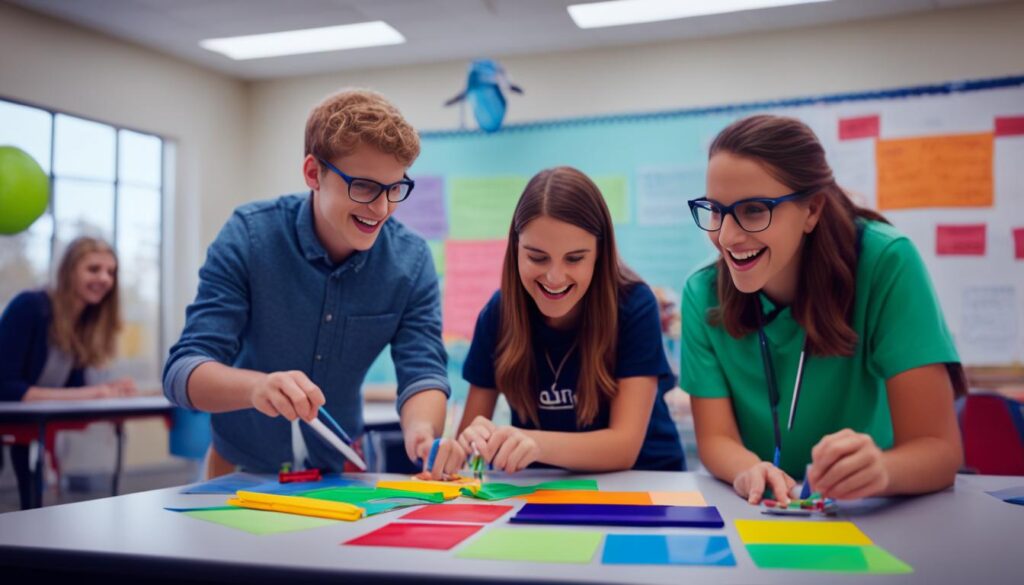
Recognizing that students have different learning preferences and styles, Ontario emphasizes the importance of appealing to diverse learning needs. By understanding and addressing these preferences, educators can create engaging and effective learning experiences that cater to the individual strengths and interests of students.
One way Ontario promotes inclusive teaching practices is through differentiated instruction. This approach recognizes that students learn best when instruction is tailored to their unique abilities and learning styles. By providing a variety of instructional strategies, materials, and assessments, educators can meet the diverse needs of students and support their academic growth.
Another approach that Ontario embraces is personalized learning. Personalized learning allows students to take ownership of their education by allowing them to pursue their interests and learning goals. By providing opportunities for students to explore topics that resonate with their individual preferences, educators can foster a sense of curiosity, engagement, and self-motivation.
“Through differentiated instruction and personalized learning approaches, Ontario aims to engage students by providing learning experiences that align with their individual strengths and interests.”
By appealing to diverse learning preferences, Ontario aims to create a learning environment where every student feels valued and supported. This approach not only enhances student engagement and motivation but also promotes the development of critical thinking, problem-solving, and other essential skills necessary for success in the 21st century.
Ultimately, by recognizing and catering to diverse learning preferences, Ontario strives to create an inclusive and effective education system that meets the unique needs of each student. By embracing differentiated instruction and personalized learning, Ontario empowers students to reach their full potential and prepares them for a lifetime of learning and success.
If you’re interested in learning more about how to create a student-centered learning environment, click here to explore the courses and resources offered by the Canada Global Academy.
Sparking Interest and Motivation to Learn

Ontario understands the significance of sparking interest and motivation in students to enhance their learning experience. By providing engaging and relevant learning opportunities, Ontario aims to foster curiosity and intrinsic motivation in students. This includes incorporating real-world connections, hands-on activities, and project-based learning approaches to make learning more meaningful and captivating. By igniting students’ interest and motivation, Ontario aims to cultivate a love for learning and promote lifelong learning habits.
One way Ontario accomplishes this is by integrating real-world connections into the curriculum. By showing students how classroom concepts apply to the real world, they are more likely to see the relevance and value of their education. This can spark genuine interest and motivation to learn, as students understand how their learning connects to their future endeavors.
Another approach is through hands-on activities. Giving students the opportunity to actively engage with the material, such as through experiments, simulations, or field trips, can make learning more interactive and exciting. Hands-on activities allow students to apply their knowledge in practical ways, which can be highly motivating and encourage a deeper understanding of the subject matter.
Project-based learning is also an effective method for sparking interest and motivation. By assigning students meaningful projects that require research, creativity, and problem-solving, Ontario encourages active learning and student autonomy. This approach allows students to explore topics they are passionate about and take ownership of their learning, fostering curiosity and a sense of accomplishment.
Furthermore, Ontario recognizes the value of fostering curiosity in students. Cultivating an environment that encourages questioning, exploration, and discovery can fuel students’ natural curiosity and stimulate their motivation to learn. By incorporating inquiry-based learning approaches and encouraging students to ask “why” and “how,” Ontario fosters a sense of wonder and encourages independent thinking.
In conclusion, Ontario’s emphasis on sparking interest and motivation in students is crucial for their educational success. By providing engaging and relevant learning opportunities that incorporate real-world connections, hands-on activities, and project-based learning, Ontario aims to foster curiosity and intrinsic motivation, ultimately cultivating a love for learning and promoting lifelong learning habits.
Promoting Multiple Intelligences and Learning Styles
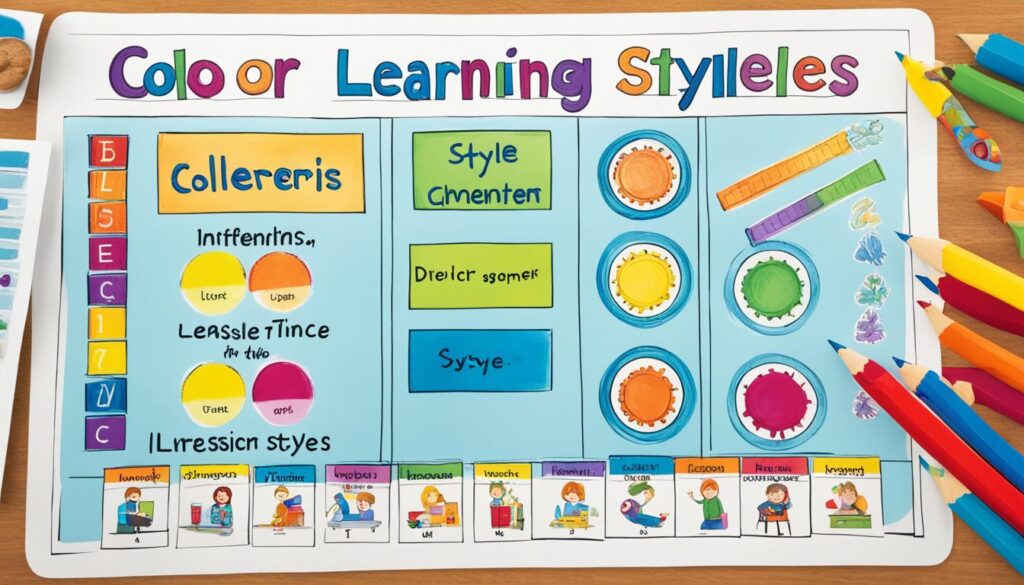
Ontario recognizes that students have diverse intelligences and learning styles. To cater to these varied needs and preferences, the province emphasizes individualized instruction and promotes the concept of multiple intelligences.
By offering a wide range of learning opportunities that tap into different intelligences, such as visual, auditory, kinesthetic, and interpersonal, Ontario aims to engage students more effectively. This approach ensures that students receive a well-rounded education that aligns with their unique strengths and abilities.
Through individualized instruction, Ontario tailors teaching methods and materials to suit each student’s learning style. This personalized approach enables students to learn in ways that are most effective for them, allowing them to thrive academically and build confidence in their learning journey.
By acknowledging and embracing diverse intelligences and learning styles, Ontario creates an inclusive and supportive learning environment where all students can reach their full potential.
Offering Meaningful Choices in Assessment

Ontario understands the importance of meaningful assessment in promoting student engagement and ownership of learning. By providing students with diverse assessment methods, such as projects, presentations, and portfolios, Ontario encourages authentic and personalized assessment. This approach allows students to demonstrate their understanding and skills in ways that align with their interests and strengths, fostering a sense of autonomy in their learning journey.
Meaningful assessment goes beyond traditional exams and tests, allowing students to showcase their abilities through real-world applications and demonstrations. By offering a range of assessment options, Ontario values student choice and provides opportunities for students to excel in different areas. This varied approach to assessment recognizes that students have unique learning styles and preferences, ensuring a fair and inclusive evaluation of their capabilities.
“Assessment should be a meaningful and reflective process that allows students to demonstrate their knowledge and skills in a way that resonates with them personally,” says Dr. Sarah Thompson, an education expert at the Global Academy for Learning.
Authentic assessment plays a crucial role in evaluating students’ progress and growth. It allows for a more accurate measurement of students’ capabilities by assessing their application of knowledge and skills in real-life scenarios. This type of assessment not only provides a deeper understanding of students’ learning but also prepares them for the challenges and expectations they will encounter beyond the classroom.
Offering meaningful choices in assessment empowers students to take ownership of their learning and approach assessments with motivation and enthusiasm. When students have a say in how they demonstrate their understanding, they are more engaged and invested in the learning process. Ontario believes that by embracing authentic and varied assessment methods, students can cultivate a deeper understanding of the subject matter and develop essential skills that will serve them well in the future.
To learn more about the student-centered approach to education and assessment, visit the Global Academy for Learning.
Making Space for Individual Pursuits

Ontario believes in providing ample opportunities for students to pursue their individual interests and passions beyond the academic curriculum. Encouraging students to engage in extracurricular activities that align with their personal goals and interests not only enhances their overall learning experience but also contributes to their holistic development.
By participating in extracurricular activities, students have the freedom to explore their diverse interests, whether in sports, arts, music, community service, or other areas. These activities provide a platform for students to showcase their talents, develop valuable skills, and foster a sense of joy and fulfillment. Whether it’s joining a sports team, participating in a debate club, or contributing to a school newspaper, students are empowered to develop their unique strengths and abilities.
Extracurricular activities also play a crucial role in fostering a sense of belonging and connection within the school community. Students have the opportunity to interact with peers who share similar interests, form lasting friendships, and build a supportive network. These experiences not only contribute to their personal growth but also enhance their social and emotional well-being.
Moreover, extracurricular activities promote personalized learning by allowing students to tailor their educational journey according to their individual passions and career aspirations. By indulging in activities that align with their interests, students develop a deeper understanding of themselves, their goals, and their unique talents. This self-discovery process contributes to their overall personal and academic growth.
“Extracurricular activities are not just an add-on; they are an essential part of a student’s educational experience.”
Ontario recognizes the importance of providing a well-rounded education that supports students’ individual pursuits and interests. By encouraging extracurricular involvement, Ontario fosters an inclusive and enriching learning environment where each student is given the opportunity to thrive and excel.
Infusing Technology to Enhance Instruction
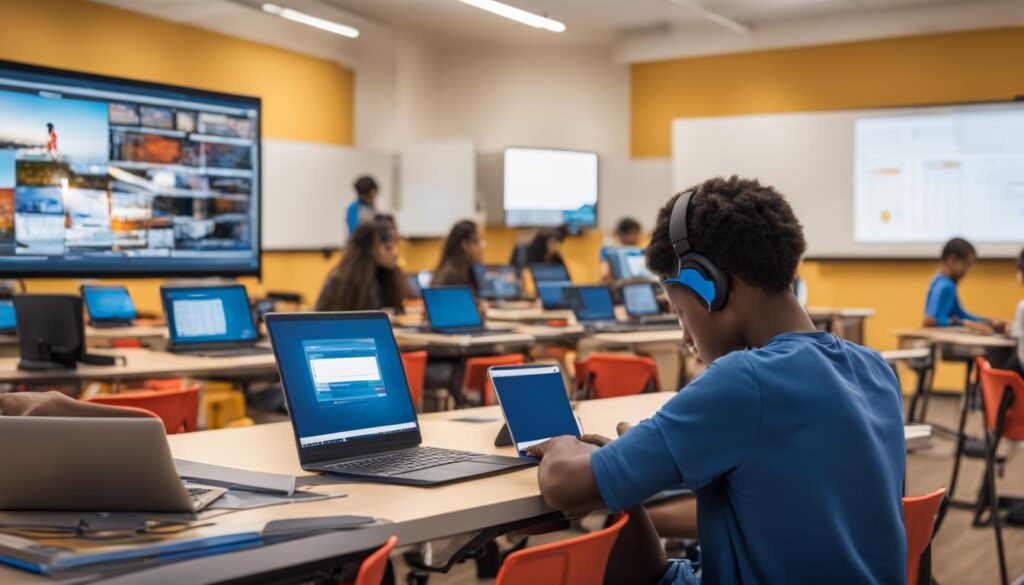
Recognizing the role of technology in enhancing instruction, Ontario embraces the use of educational technology to support and enhance learning experiences. By integrating technology into classrooms and curriculum, Ontario aims to provide students with the necessary digital literacy skills and prepare them for the technological demands of the future. This includes leveraging technology tools and resources to promote collaboration, critical thinking, creativity, and innovation in student learning.
Technology integration plays a crucial role in equipping students with the skills they need to thrive in the digital age. Through the use of digital devices, software applications, online resources, and interactive platforms, students can engage in digital learning experiences that enhance their understanding and broaden their perspectives.
The integration of technology in education not only enhances the teaching and learning process but also prepares students for the rapidly evolving job market. By familiarizing students with technology tools and platforms, Ontario equips them with the educational technology skills needed to succeed in a digital society.
Technology in education opens doors to new and innovative learning opportunities. It empowers students to explore, create, collaborate, and connect with the world in ways that were once unimaginable.
Through technology integration, teachers can personalize instruction to meet the unique needs of each student, providing tailored learning experiences that foster engagement and mastery. Technology also offers a wealth of resources and information, enabling students to access a diverse range of learning materials and explore topics beyond the limits of traditional textbooks.
Moreover, technology integration facilitates collaborative learning, allowing students to work together on projects, share ideas, and collaborate across distances. This fosters educational technology integration critical skills such as communication, teamwork, and problem-solving.
Ontario embraces technology as a catalyst for educational transformation. By integrating technology into instruction, Ontario cultivates a dynamic and interactive learning environment where students can develop the necessary skills, knowledge, and capacities to thrive in a digital world.
If you want to learn more about technology integration in education, visit Canada Global Academy and explore their comprehensive courses and resources.
Preparing Students Holistically for the Future
Ontario has a strong commitment to preparing students for success beyond the classroom. The province believes in providing a well-rounded education that equips students with the necessary skills and competencies to thrive in a rapidly changing world. By fostering the development of 21st-century skills, such as critical thinking, problem-solving, communication, collaboration, and adaptability, Ontario ensures that students are future-ready.
Holistic education is at the core of Ontario’s approach. It goes beyond academic knowledge by focusing on the development of social, emotional, and practical skills. Ontario believes that well-rounded students are better prepared to face the challenges and opportunities that lie ahead. By nurturing these skills, Ontario aims to empower students to navigate complex issues, communicate effectively, work collaboratively, and adapt to new environments.
As students acquire these future-ready skills, they become equipped to tackle real-world problems and make meaningful contributions to society. Ontario’s education system encourages students to think critically, solve problems creatively, and communicate their ideas with confidence. By embracing a holistic approach, Ontario ensures that students are prepared to navigate an ever-evolving job market and succeed in a rapidly changing world.
Discover how Ontario’s student-centered and holistic education approach can empower students for the future. Explore the programs and opportunities available at Canada Global Academy to provide your child with a well-rounded education encompassing 21st-century skills, character development, and personal growth.
FAQ
What is the vision for student-centered learning by the Ontario Ministry of Education?
The Ontario Ministry of Education’s vision for student-centered learning focuses on developing the knowledge, skills, and characteristics that will lead students to become personally successful, economically productive, and actively engaged citizens.
How does Ontario promote inclusivity in education?
Ontario recognizes the diverse abilities and needs of students and strives to create an inclusive education system by providing appropriate support and accommodations for students with disabilities and special educational needs.
How does Ontario foster readiness to learn?
Ontario focuses on fostering a positive and supportive learning environment that promotes each student’s readiness to learn, encompassing factors such as physical, social, emotional, and cognitive readiness.
How does Ontario address language barriers and promote cultural understanding?
Ontario acknowledges the impact of language barriers and the importance of cultural understanding in education. Efforts are made to support English language learners and provide resources and opportunities for students to learn about different cultures.
How does Ontario accommodate diverse learning needs and preferences?
Ontario emphasizes the importance of appealing to diverse learning needs through differentiated instruction and personalized learning approaches, catering to different learning preferences and styles.
How does Ontario ignite interest and motivation in students?
Ontario provides engaging and relevant learning opportunities, incorporating real-world connections, hands-on activities, and project-based learning approaches to foster curiosity and intrinsic motivation in students.
How does Ontario cater to different intelligences and learning styles?
Ontario promotes individualized instruction and the recognition of multiple intelligences, offering a variety of learning opportunities that tap into different intelligences such as visual, auditory, kinesthetic, and interpersonal.
How does Ontario provide meaningful choices in assessment?
Ontario provides students with options to demonstrate their understanding and skills through varied assessment methods, such as projects, presentations, and portfolios, valuing authentic and personalized assessment.
How does Ontario support students’ individual pursuits and interests?
Ontario provides opportunities for students to explore their passions and engage in extracurricular activities that align with their personal goals and interests, promoting a well-rounded education beyond academic subjects.
How does Ontario incorporate technology into instruction?
Ontario embraces the use of educational technology to support and enhance learning experiences, integrating technology into classrooms and curriculum to provide students with necessary digital literacy skills and prepare them for the future.
How does Ontario prepare students holistically for the future?
Ontario equips students with the necessary skills and competencies for success beyond the classroom, fostering the development of 21st-century skills such as critical thinking, problem-solving, communication, collaboration, and adaptability.
Source Links
- https://www.oise.utoronto.ca/home/sites/default/files/2023-09/on_01_04_14_-_renewedvision.pdf
- http://ncee.org/wp-content/uploads/2017/01/Ont-non-AV-10-Ontario-Government-Achieving-Excellence-A-renewed-vision-for-education-in-Ontario.pdf
- https://www.osta-aeco.org/wp-content/uploads/2019/05/ostaaecovisiondocument.pdf

Martin Doherty is the CEO of Ethos Education & Canadian Global Academy : the exclusive authorized provider of the renowned 3rd globally ranked Ontario Ministry of Education‘s curriculum and Digital Learning Platform outside of Canada. He is also the founder the cutting edge magazine, Education Distruptor.
Through our School Partnership Program, we empower schools worldwide to attain Canadian Accreditation, providing the opportunity to establish themselves as Canadian Accredited schools. Additionally, home-based businesses can run their own Canadian Accredited Micro-School. Contact us today to learn more!
Related Posts
- Personalized Learning Revolution: Tailoring Education to Every Student's Potential
Unlock the power of educational expertise to customize learning for every student's unique potential. Embrace…
- Microschool & Pod Revolution: How Virtual Learning is Reshaping Education Globally
Explore the transformative power of microschooling and pods through cutting-edge School Technology & Innovation. Shape…


